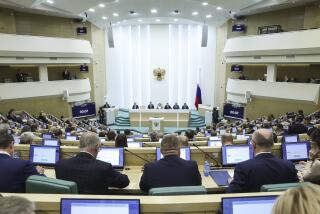China Flouts Nuclear Moratorium With Test : Asia: Underground explosion had been delayed until U.S. renewed its favored trading status.
BEIJING — For the second time in eight months, China defied an international moratorium on nuclear testing by setting off an underground nuclear explosion Friday at a remote site in western China.
The blast--estimated by seismologists to be of medium yield, 10 to 60 kilotons--had been predicted for weeks by U.S. and Japanese intelligence agencies, which spotted preparations under way for the test at Lop Nor in Xinjiang province.
The Chinese government delayed the test until after the June 4 deadline set by President Clinton for renewal of most-favored-nation trading status for China. Despite objections from human rights organizations, Clinton authorized the renewal in late May.
Ironically, the test Friday was conducted at the same time the Chinese leadership was being urged by the United States and other countries to take a leading role in pressuring North Korea to allow international inspections of its nuclear facilities, where many fear Pyongyang has an embryonic nuclear weapons program.
Earlier this week, Chinese leaders met with North Korean army Chief of Staff Choi Gwang and, separately, with South Korean Foreign Minister Han Sung Joo in an effort to resolve the crisis over North Korea’s refusal to allow international inspection of its nuclear facilities. Japanese Foreign Minister Koji Kakizawa arrives Sunday for similar discussions.
In a break with tradition, China announced the test itself. In an official release, the government said it will continue to participate in negotiations with other nuclear powers seeking a comprehensive nuclear test ban treaty.
Patricia Lewis, director of the Verification Technology Information Center in London, a nuclear proliferation watchdog organization, said the Chinese test “could set back comprehensive nuclear test ban talks by months.”
“It will also strengthen the hand of hard-liners in France who are pushing for a resumption of nuclear testing in the Pacific,” Lewis said.
The test, China’s second since Oct. 5, 1993, threatened to disrupt the fragile moratorium on nuclear testing established by the United States, France and Russia in 1992 when they began talks seeking a comprehensive test ban agreement.
In January, China joined with the other powers in talks in Geneva seeking a test ban treaty by 1995. In its news release Friday announcing the test, the Chinese government said it still “supports the conclusion of such treaty no later than 1996.”
Western military experts have downplayed the significance of China’s nuclear program, which they say is still in the early stages. In its history, China has conducted 40 nuclear tests, compared to more than 1,000 by the United States.
Its arsenal, estimated at 250 to 300 nuclear warheads, is smallest of the five main nuclear powers.
The United States staged its last test in 1992, France and Britain conducted their last in 1991 and Russia in 1990. Since 1992, China has been the only nuclear power to continue testing.
Clinton Administration officials expressed U.S. displeasure at the Chinese action.
“The United States deeply regrets this action,” White House Press Secretary Dee Dee Myers said in a statement.
“We urge China to refrain from further nuclear tests and to join the other nuclear powers in a global moratorium as we work to complete a comprehensive test ban treaty,” White House Press Secretary Dee Dee Myers said in a statement.
More to Read
Sign up for Essential California
The most important California stories and recommendations in your inbox every morning.
You may occasionally receive promotional content from the Los Angeles Times.










